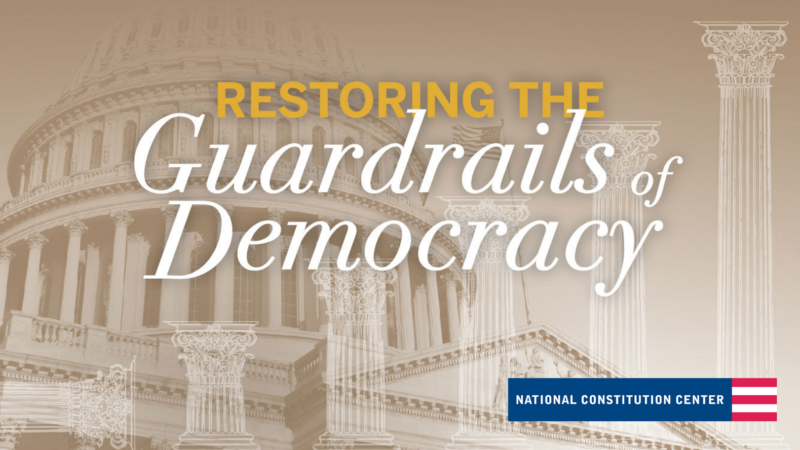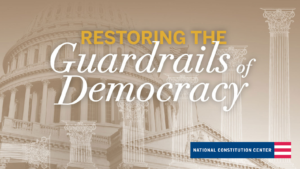

One of the fun conditions of this project is that the three teams did not in any way collaborate with each other or get an advance look at what the others were going to say. As a result some recommendations overlap between teams in a positive way, some conflict, and many others simply don't engage one way or the other. For example, we at Team Libertarian reached very similar conclusions to Team Progressive on reforming the Electoral Count Act, but a mostly opposite conclusion (as Prof. Foley has noted) on whether government should seek to regulate false statements about elections. And although Team Conservative's comments on restricting presidential emergency powers both dovetail with ours and add useful detail, few of our other recommendations engage.
Although we and Team Conservative may have marched off in different directions, I and many Cato Institute colleagues are on board with much of what they say. Runaway administrative agencies usurping legislative power? Yes, a big problem. Congressional abdication of power stretching over for a half-century or more, shifting responsibility to the President and the judiciary? Definitely. I agree too that there's a decent case for making it at least a bit easier to amend the U.S. Constitution. (Here's a Cato fellow writing in 2011 proposing a modest reduction in the threshold number of states needed for proposing and ratifying an amendment.) The need to move past a broken primary system in which candidates with independent and crossover appeal get knocked out because they can't appease their party's most zealous base voters? Right again.
On the topic of elections, we're also in agreement with Team Conservative's observation that campaign finance reforms have backfired and that we should be repealing such laws rather than adding more. But let's also get real: the election world wasted much of 2021 in a battle over whether Democrats would succeed in ramming through an omnibus package expanding these laws yet further. As I've argued, this package, the so-called For The People Act, 1) put its thumb in the eye of libertarian and constitutionalist principle, and 2) was supremely irrelevant to the distinctive challenges of the events leading up to Jan. 6. Shouldn't we focus on reform efforts that have a chance of doing relevant good between now and the next grave election crisis down the road – which we might find ourselves in the middle of by a date as early as, say, 2024?
Which brings me to some policy disagreements with Team Conservative. I can't say I'm persuaded by the idea of letting Congress override presidential vetoes by simple majority vote, as Tennessee does. The Founders meant to establish serious checks and balances against the dangers of hasty legislation, and gutting the power of the president's veto would knock out one of the most important of those checks. (For what it's worth, my home state of Maryland sets its veto-override threshold at three-fifths rather than two-thirds – not that I'm recommending that, either.) On bringing back the legislative veto, I share the misgivings about that innovation expressed by Antonin Scalia, then editor of Regulation, many years ago.
Now on to Team Progressive. On one major point we agree strongly: it's incredibly dangerous when a controlling faction of one of the two great political parties wrongly contends that honest and correctly tabulated elections were stolen or rigged. The Progressive report gives this problem a central place in its analysis, and that seems right to me.
Yet there are differences of mood and terminology in our approaches as well. As I commented on Twitter the other day, I continue to search for phrases other than "Big Lie" and "election denier" that would let us criticize both these things without using terminology associated with you-know-what. Millions of persons sincerely believe the false claims in question. They are truly convinced that they, not we, are doing the right thing and standing up for fair and free elections. There are some genuine villains out there feeding them lies, as well as crazies irresponsibly stoking mass delusion. But the ordinary believers are also our friends, our relatives, and our neighbors. We cannot stop being those things to them if America is to gather back its wits and turn back down the road toward some semblance of unity.
As to policy, I'm a convinced advocate of ranked-choice voting, but I'd caution that its advantages are relatively subtle; it won't put out the fire of public disbelief in election results. The fact is that in some key states, election fabulists may presently be popular enough to win, or at least put up a strong contest, under whichever set of rules is used. (I also think the plain-vanilla version of RCV, sometimes called instant-runoff voting, is better suited to today's America than the more complex "round-robin" variant that Foley recommends.)
We and Team Progressive likely part company on some issues of federalism and decentralization. Ned Foley and Ilya Somin have already discussed this a bit as to foot voting, and I suspect that our teams may also diverge on to what extent the federal government should play a greater role in supervising the states in election administration; we caution against this at several points.
Also on the Foley-Somin exchange linked above, I'll mention for what it's worth that I'm probably a little more positive about civics education than Ilya is. Still, I do recognize there can be difficult problems in legitimately educating the public about how the electoral system works, on the one hand, while avoiding the specter of taxpayer-funded propaganda campaigns, on the other. (As an example of the challenges involved, here's how the Nebraska Secretary of State set about refuting myths and rumors about the 2020 count.)
Thanks to the National Constitution Center for making possible this summer's exchange of views with writers and scholars we respect, and to the Volokh Conspiracy for hosting this shorter symposium this week.
The post Guardrails of Democracy, Extended: Comparing Notes On The Team Libertarian Report appeared first on Reason.com.







